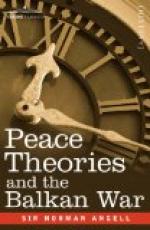What have peace theories to do with this war? asks the practical man, who is the greatest mystic of all, contemptuously. Well, they have everything to do with it. For if we had understood some peace theories a little better a generation or two ago, if we had not allowed passion and error and prejudice instead of reason to dominate our policy, the sum of misery which these Balkan populations have known would have been immeasurably less. It is quite true that we could not have prevented this war by sending peace pamphlets to the Turk, or to the Balkanese, for that matter, but we could have prevented it if we ourselves had read them a generation or two since, just as our only means of preventing future wars is by showing a little less prejudice and a little less blindness.
And the practical question, despite Mr. Churchill, is whether we shall allow a like passion and a like prejudice again to blind us; whether we shall again back the wrong horse in the name of the same hollow theories drifting to a similar but greater futility and catastrophe, or whether we shall profit by our past to assure a better future.
[Footnote 6: 14/11/12]
[Footnote 7: The Life of Richard Cobden.—UNWIN.]
CHAPTER VI.
PACIFISM, DEFENCE, AND “THE IMPOSSIBILITY OF WAR.”
Did the Crimean War prove Bright and Cobden wrong?—Our curious reasoning—Mr. Churchill on “illusions”—The danger of war is not the illusion but its benefits—We are all Pacifists now since we all desire Peace—Will more armaments alone secure it?—The experience of mankind—War “the failure of human wisdom”—Therefore more wisdom is the remedy—But the Militarists only want more arms—The German Lord Roberts—The military campaign against political Rationalism—How to make war certain.
The question surely, which for practical men stands out from the mighty historical episode touched on in the last chapter, is this: Was the fact that these despised men were so entirely right and their triumphant adversaries so entirely wrong a mere fluke, or was it due to the soundness of one set of principles and the hollowness of the other; and were the principles special to that case, or general to international conflict as a whole?
To have an opinion of worth on that question we must get away from certain confusions and misrepresentations.
It is a very common habit for the Bellicist to quote the list of wars which have taken place since the Crimean War as proof of the error of Bright and Cobden. But what are the facts?
Here were two men who strenuously and ruthlessly opposed a certain policy; they urged, not only that it would inevitably lead to war, but that the war would be futile—but not sterile, for they saw that others would grow from it. Their counsel was disregarded and the war came, and events have proved that they were right and the war-makers wrong, and the very fact that the wars took place is cited as disapproving their “theories."[8]




